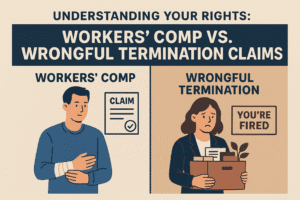If you’ve been injured at work and later fired, you may be wondering: can I still sue my employer for wrongful termination after settling my workers’ compensation claim? This is one of the most common questions we receive from clients who have experienced workplace retaliation after filing workers’ comp claims.
The short answer is yes, but only if your settlement was structured correctly.

Understanding Your Rights: Workers’ Comp vs. Wrongful Termination Claims
Many employees don’t realize that workers’ compensation claims and wrongful termination lawsuits are completely separate legal matters. Here’s the key difference:
- Workers’ Compensation: Provides medical treatment and disability benefits for workplace injuries
- Wrongful Termination/FEHA Claims: Compensates for the experience illegal discrimination, retaliation, and failure to accommodate disabilities. Damages are much broader and include back wages, future lost wages, emotional distress, and potentially, punitive damages.
Under California law, you have dual protections:
- Labor Code Section 132(a): Prohibits employers from retaliating against employees for filing workers’ comp claims
- Fair Employment and Housing Act (FEHA): Protects against disability discrimination and retaliation for requesting accommodations
When Employers Violate Employment Laws During Workers’ Comp Cases
Sometimes after an employee gets injured at work, files a workers’ comp claim, and receives medical restrictions from their doctor; Instead of engaging in the interactive process to find reasonable accommodations, the employer:
- Ignores work restriction reports
- Refuses to discuss modified duties
- Terminates the employee for “exhausting leave”
- Claims there are “no available accommodations”
This can be illegal retaliation, regardless of whether the workers’ comp claim for the original injury was settled.
The Settlement Document Trap: How Workers’ Comp Settlements Can Block Wrongful Termination Claims
Unfortunately, some workers unknowingly sign away their right to sue for wrongful termination during their workers’ comp settlement. Here are the three most dangerous provisions:
1. “Voluntary Resignation” Language
Red Flag: Settlement documents that require you to sign a “voluntary resignation.”
Why It’s Dangerous: This makes it difficult to prove wrongful termination since you’ve agreed you quit voluntarily.
2. General Release Addendum
Red Flag: Broad language releasing “all claims” against your employer.
Why It’s Dangerous: This can completely bar any future employment lawsuits.
What to Avoid: Never sign a general release of your civil claims in a workers compensation case until you have received a consultation to determine whteher you were illegally terminated or discriminated against.
3. Overly Broad Settlement Language
Red Flag: Language stating the settlement covers “all known or unknown injuries” or “all claims against the employer.”
Why It’s Dangerous: Employers will argue this includes your emotional distress damages from discrimination.
Dual Recovery: Maximizing Your Compensation
When properly preserved, you can pursue both types of claims simultaneously:
Workers’ Comp Retaliation Benefits:
- Up to $10,000 increase in benefits
- Reinstatement rights
- Lost wage reimbursement
Wrongful Termination Lawsuit Damages:
- Economic damages (lost wages, benefits, future earnings)
- Emotional distress damages
- Attorney fees and costs
- Potential punitive damages
Common Employer Violations We See in Practice
It’s not uncommon that after a worker files a workers compensation claim for an employer to engage in these illegal employer practices:
- Failure to accommodate: Not engaging in the interactive process when receiving medical restrictions
- Disability discrimination: Using “policy violations” or “performance issues” as a pretext for illegal discrimination
- Retaliation: Terminating employees for filing workers’ comp claim
Take Action: Free Consultation for Wrongful Termination Cases
If you were fired after filing a workers’ compensation claim, don’t let a poorly drafted settlement prevent you from getting the justice you deserve. Time limits apply to employment law claims, so it’s crucial to act quickly.
Contact the experienced wrongful termination attorneys at Workers Rights Law Firm, APC today for a free consultation. We’ll review your case, explain your options, and help you understand whether you can still pursue a wrongful termination lawsuit after your workers’ comp settlement.
Keywords: wrongful termination attorney, employment law, workers compensation retaliation, FEHA claims, disability discrimination, California employment lawyer, workplace retaliation, wrongful termination lawsuit
